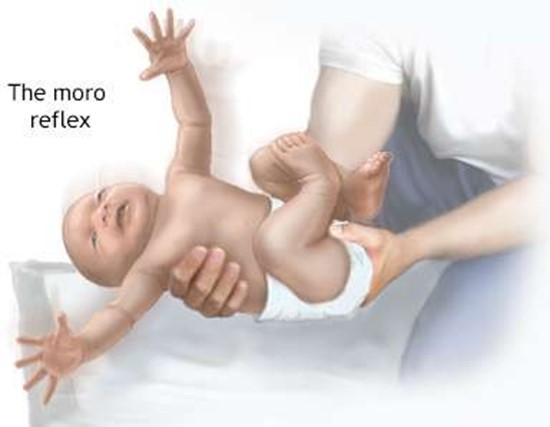A nurse is checking a newborn’s Moro reflex.
Which of the following actions should the nurse take to elicit this reflex?
Place the newborn on their abdomen and observe the movement of their extremities.
Stroke the newborn’s cheek toward their mouth.
Stroke upward on the lateral aspect of the newborn’s foot.
Place the newborn on a flat surface and clap hands loudly.
The Correct Answer is D
Place the newborn on a flat surface and clap hands loudly.

This action will elicit the Moro reflex, also known as the startle reflex, which is a normal, involuntary reaction that newborns and infants have when they’re startled. In response to the sound, the baby will throw back his or her head, extend out his or her arms and legs, cry, then pull the arms and legs back in.
Choice A is wrong because placing the newborn on their abdomen and observing the movement of their extremities will not trigger the Moro reflex.
This position may elicit other reflexes such as the crawling reflex or the tonic neck reflex.
Choice B is wrong because stroking the newborn’s cheek toward their mouth will not trigger the Moro reflex. This action will elicit the rooting reflex, which helps the baby find the breast or bottle to start feeding.
Choice C is wrong because stroking upward on the lateral aspect of the newborn’s foot will not trigger the Moro reflex. This action will elicit the Babinski reflex, which causes the big toe to extend upward and the other toes to fan out.
Nursing Test Bank
Naxlex Comprehensive Predictor Exams
Related Questions
Correct Answer is A
Explanation
This instruction helps the client to establish a baseline of their bladder function and identify their voiding patterns. It also helps the nurse to design an individualized bladder-training program for the client.
Choice B is wrong because drinking 4 liters of fluid between 6:00 a.m. and 8:00 p.m. is excessive and can increase the frequency and urgency of urination. The client should drink enough fluids to prevent dehydration and constipation, but avoid drinking large amounts at one time or before bedtime.
Choice C is wrong because voiding every 2 hours while awake is not a bladder- training technique, but a scheduled toilet trip. Bladder training requires following a fixed voiding schedule and delaying urination after feeling the urge to go. Voiding every 2 hours may not allow the bladder to fill sufficiently and may interfere with the goal of increasing the bladder capacity.
Choice D is wrong because eliminating caffeine from the diet is not a specific instruction for bladder training, but a general lifestyle strategy to ease bladder problems. Caffeine can irritate the bladder and act as a diuretic, which can increase urine production and frequency.
However, eliminating caffeine alone may not be enough to improve urinary incontinence.
Correct Answer is A
Explanation
Transferring the client from the bed to a chair. This is a task that can be delegated to an assistive personnel because it does not require nursing judgment or assessment. The nurse should provide clear instructions and supervise the assistive personnel during the transfer.
Choice B is wrong because checking the client’s surgical dressing for bleeding is a nursing assessment that requires clinical judgment and cannot be delegated.
The nurse should monitor the dressing for signs of infection, drainage, or dehiscence.
Choice C is wrong because determining whether the client has incisional pain is a nursing assessment that requires communication and evaluation skills and cannot be delegated.
The nurse should assess the client’s pain level, location, quality, and duration and administer pain medication as prescribed.
Choice D is wrong because showing the client how to use an incentive spirometer is a nursing intervention that requires teaching and evaluation skills and cannot be delegated.
The nurse should instruct the client on how to use the device to promote lung expansion and prevent atelectasis.
Whether you are a student looking to ace your exams or a practicing nurse seeking to enhance your expertise , our nursing education contents will empower you with the confidence and competence to make a difference in the lives of patients and become a respected leader in the healthcare field.
Visit Naxlex, invest in your future and unlock endless possibilities with our unparalleled nursing education contents today
Report Wrong Answer on the Current Question
Do you disagree with the answer? If yes, what is your expected answer? Explain.
Kindly be descriptive with the issue you are facing.
